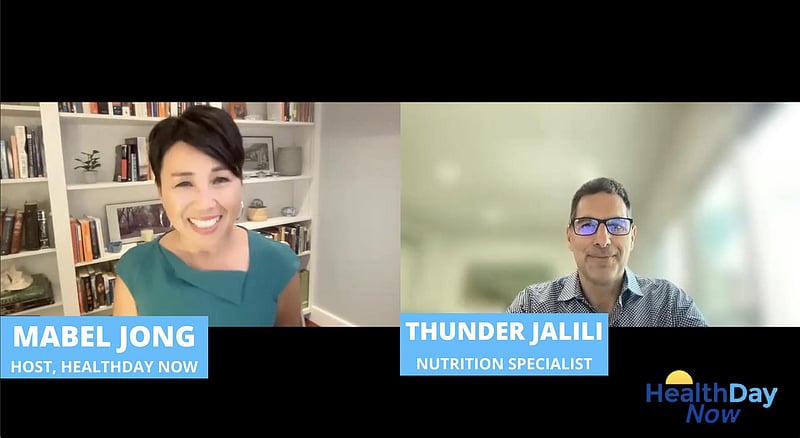Get Healthy!
73 Results for search "Vitamins / Minerals".
Health News Results - 73
While vitamin D got some attention early in the pandemic, it does not reduce the risk of either COVID-19 or other respiratory infections, two new clinical trials found.
Both studies, one done in the United Kingdom and the other in Norway, found that boosting levels of vitamin D in adults during the pandemic didn't help protect against
Many new parents have been jarred awake in the dead of night when they hear their baby let out that telltale barky cough that signals a bout of croup.
Until now, nothing was thought to stave off the disease in babies who are prone to it, but a new study has discovered that when women took hi...
- HealthDay Reporter
- Denise Mann
- |
- September 7, 2022
- |
- Full Page
Kids can take part in sports while on vegetarian and vegan diets, but parents and caregivers must help them select foods that will fuel them and meet their nutrition needs.
Vegan athletes can become deficient in vitamin B12, vitamin D, long-chain omega-3 fats, riboflavin and calcium, so it's important to find good substitutes, said Roberta Anding, a registered dietitian at Baylor College ...
- HealthDay Reporter
- Cara Murez
- |
- August 20, 2022
- |
- Full Page
Most Americans swear by dietary supplements, with nearly 3 of 4 people taking some type of supplement on a daily basis, a new HealthDay/Harris Poll has revealed.
But many have a mistaken belief in the effectiveness of these supplements, which for the most part don't help folks live longer or healthier live...
- HealthDay Reporter
- Dennis Thompson
- |
- August 2, 2022
- |
- Full Page
Seniors who take vitamin D supplements to improve their bone health and ward off fractures are just wasting their time and money, a major new study has found.
These supplements did nothing to reduce their average risk of
- HealthDay Reporter
- Dennis Thompson
- |
- July 28, 2022
- |
- Full Page
Eating a rainbow of fruits and vegetables is common advice, but many Americans eat few of these nutrient powerhouses, according to a new study.
This includes adults with chronic kidney ...
- HealthDay Reporter
- Cara Murez
- |
- July 28, 2022
- |
- Full Page
Vitamin D supplements are often touted for their health benefits, from boosting the immune system to guarding against cancer. But as one British man found out, it is possible to get too much of a good thing.
Vitamin D overdosing -- clinically called hypervitaminosis D -- is linked to a range of potentia...
- HealthDay Reporter
- Cara Murez
- |
- July 6, 2022
- |
- Full Page
Vitamin D, the "Sunshine Vitamin," boosts the immune system and helps prevent cancer, among other health benefits, but a significant number of Black and Hispanic teens have low levels of this nutrient, according to a new study.
"This paper calls attention to the need to raise...
- HealthDay Reporter
- Cara Murez
- |
- July 5, 2022
- |
- Full Page
Millions of people pop vitamins and supplements every day in hopes of staving off heart disease and cancer, but a new report finds the evidence to support that strategy is largely lacking.
While there is some research showing that a daily multivitamin may slightly reduce cancer risk, the bigger pictur...
- HealthDay Reporter
- Denise Mann
- |
- June 21, 2022
- |
- Full Page
A genetically engineered tomato could one day rival salmon as a dietary source of vitamin D, if early research pans out.
British scientists used gene "editing" to produce the tomato, which is chock full of provitamin D3, a precursor that the body can convert into vitamin D.
The gene twe...
- HealthDay Reporter
- Amy Norton
- |
- May 24, 2022
- |
- Full Page
Seniors are often advised to take calcium supplements, but new research says the pills might significantly increase an aging person's risk of heart valve problems that contribute to heart failure.
People taking either calcium supplements alone or calcium with vitamin D had a higher risk of heart-related death or death from any cause compared with people not taking supplements, the researc...
- HealthDay Reporter
- Dennis Thompson
- |
- April 26, 2022
- |
- Full Page
If your child is a picky eater and you feel you need to give them dietary supplements, you're not alone.
In a new poll of more than 1,200 U.S. parents with at least one child aged 1 to 10, more than half said they struggle to get their child to eat a well-balanced diet and half said they regularly give their child dietary supplements.
About one-third of parents said their child is a...
- HealthDay Reporter
- Robert Preidt
- |
- April 20, 2022
- |
- Full Page
Remember when everyone was downing zinc supplements at the beginning of the pandemic, in hopes of guarding against a severe case of COVID-19?
New research suggests that folks may have wasted their time and effort: Taking zinc, vitamin C or vitamin D supplements doesn't lower one's risk of dying from COVID-19.
- HealthDay Reporter
- |
- February 22, 2022
- |
- Full Page
Taking vitamin D supplements may help stave off psoriasis, rheumatoid arthritis, lupus and other autoimmune diseases, a new study suggests.
Previous research has hinted at this connection, but the new study is the first randomized controlled trial to look at what happens when people are given vitamin D supplements and followed to see if they develop an
They may have other proven health benefits, but new research shows that fish oil supplements don't prevent depression or improve mood.
Some experts recommend omega-3 fish oil supplements to help prevent depression in high-risk patients, but studies have yielded mixed results and there are no g...
- HealthDay Reporter
- Robert Preidt
- |
- December 22, 2021
- |
- Full Page
Many cancer patients take dietary supplements in hopes of keeping their disease at bay, but British researchers say there's little evidence it will pay off.
In fact, they add, supplements may not only be ineffective, but harmful as well.
"We found 1 in 5 people who had been treated for cancer mistakenly thought that taking vitamins or other supplements would help reduce the ris...
- HealthDay Reporter
- Steven Reinberg
- |
- December 20, 2021
- |
- Full Page
Children at risk for multiple sclerosis (MS) might find some protection from the disease by spending more time in the sun, a small study suggests.
Although MS is rare in children and young adults, those with relatives who have the condition have increased odds of developing the disease early. Exposure to sunlight may cut their risk in half, researchers say.
"In families where there'...
- HealthDay Reporter
- Steven Reinberg
- |
- December 9, 2021
- |
- Full Page
Most people know that sun-sourced vitamin D is good for their bones. So could avoiding the sun to reduce skin cancer risk weaken your bones?
A new study brings a reassuring answer: "Sun-protective" behavior -- wearing long sleeves, seeking shade or using sunscreen -- "was not associated with decreased bone mineral density or increased risk of osteoporotic fracture," the researchers conclu...
- HealthDay Reporter
- Ernie Mundell
- |
- November 18, 2021
- |
- Full Page
Many people pop a zinc supplement at the first sign of a cold, and there's new evidence supporting the habit.
Australian researchers found that the supplements appear to help shorten respiratory tract infections, such as colds, flu, sinusitis and pneumonia.
Many over-the-counter cold and cough remedies offer only "marginal benefits," the researchers noted, making "zinc a viable 'na...
- HealthDay Reporter
- Ernie Mundell and Robert Preidt
- |
- November 2, 2021
- |
- Full Page
Black American women with low levels of vitamin D have higher odds of developing colon cancer, according to a new research that echoes previous findings in white women.
Researchers used a vitamin D prediction model for nearly 50,000 participants in the Black Women's Health Study and concluded that those with predicted levels in the bottom 25% had an estimated 40% higher risk of colon canc...
- HealthDay Reporter
- Robert Preidt
- |
- October 27, 2021
- |
- Full Page
Iron is vital to health, and too little in your diet might lead to heart disease, European researchers report.
They said about 1 in 10 new cases of heart disease in middle-aged people might be prevented if they had sufficient levels of iron in their diets.
"Our findings are based on an observational study and can therefore only report on associations, not on causality," said lead re...
- HealthDay Reporter
- Steven Reinberg
- |
- October 6, 2021
- |
- Full Page
Eating foods high in five key nutrients can help you have soft, glowing, healthy skin, an expert says.
Omega-3s: While they're typically associated with brain and heart health and lower blood pressure, they also "can reduce inflammation and keep your skin moisturized," clinical dietitian Margaret Ifarraguerri, of LifeBridge Health's Sinai Hospital of Baltimore, said in a ...
- HealthDay Reporter
- |
- August 21, 2021
- |
- Full Page
Foods rich in vitamin D may help protect younger adults against colon cancer, researchers report.
While colon cancer is decreasing overall, cases among younger adults have been on the rise. The trends dovetail with a decline in vitamin D intake from foods such as fish, mushrooms, eggs and milk.
There is growing evidence of a link between vitamin D and risk of colon cancer death, but...
- HealthDay Reporter
- Robert Preidt
- |
- August 18, 2021
- |
- Full Page























